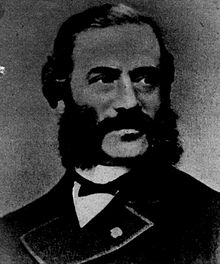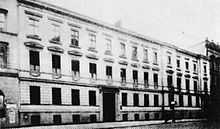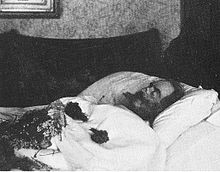Gerson von Bleichröder
Gerson Bleichröder , from 1872 von Bleichröder (* December 22, 1822 in Berlin ; † February 19, 1893 ibid), was a German-Jewish banker and as " Bismarck's banker " and representative of the Rothschild banks in the Berlin financial center, one of the most important private bankers of his Time.
Life
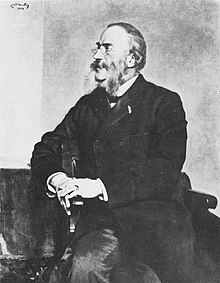
Gerson Bleichröder was a son of Samuel Bleichröder (1779–1855). He founded the S. Bleichröder bank in 1803 and developed into the main correspondent of the Rothschild banks from the 1830s onwards . Gerson Bleichröder became a partner in his father's company in 1847 and, after his father's death in 1855, senior partner. Around 1860, the Bleichröder Bank was one of the top addresses on the market for government bonds and, together with the Cologne bank Sal. Oppenheim , was a leader in early railway and industrial finance. Participation in the financing of Russian companies and the Russian state budget also became important. As a prominent member of the Prussian Consortium , an association of leading German banks, Bleichröder was involved in the financing of Prussia and the Reich.
Contemporaries he was considered one of the richest men in Prussia and the world - his fortune was given at 100 million gold marks . His international appearance as Bismarck's emissary must also be seen against the background of his successful banking activities. Bismarck used Bleichröder's business relationships with the Rothschilds and other important private bankers in many European capitals to obtain information about the economic and political situation in these countries. At the same time, he benefited from the fact that Bleichröder socialized with the economic and sometimes the political elites of these countries. Since Bismarck and Bleichröder cultivated a trusting to friendly relationship with each other (Bleichröder is considered one of Bismarck's "closest advisers"), the banker and private man Bleichröder was able to carry delicate messages that Bismarck did not want to formulate on the official, diplomatic stage.
Bleichröder and bankers cooperating with him organized the financing of the Austro-Prussian War of 1866 through a government loan. The "revolutionary" plan by Abraham Oppenheim and Bleichröder, advocated by Bismarck, to privatize the state-owned mines in the Saar region and thus finance the war, did not prevail with the Prussian king. Bleichröder was significantly involved in the negotiations and the handling of the French reparations payments following the Franco-Prussian War of 1870–71.
Gerson Bleichröder was one of the assimilated Jews and Bismarck was considered "conservative and loyal". Despite his business success and his services to the government, he did not succeed in establishing himself at the top of Wilhelmine society without being challenged (see also Anti-Semitism (until 1945) ).
Until the 1880s, Gerson Bleichröder, together with the Belgian banker Maurice de Hirsch from Bavaria, was the most important German investor in the Ottoman Empire at the time . The two Jewish bankers were, however, ousted from the oriental business by the Deutsche Bank in the course of the beginning of the state imperialist policy of the German Reich, especially in connection with the Baghdad Railway project , in which Hirsch no longer played a role and the Bleichröder bank only played a subordinate role. From 1908 the Bleichröder bank was one of the most important financiers of the newly founded Istanbul daily Ottoman Lloyd , which appeared until November 1918.
Bleichröder received a large number of awards in the course of his life. In 1872 he was raised to hereditary nobility at the same time as the Berlin banker Adolph (von) Hansemann and as the first Jew in Prussia . But the latent and since the 1880s increasing anti-Semitism in the German public of the empire kept the Jewish banker at a distance from the people who benefited most from him and whose esteem he most wanted, from the rest of the nobility.
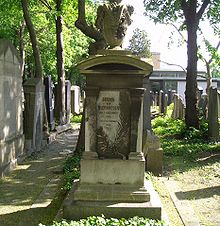
Gerson von Bleichröder was, like his father Samuel and his brother Julius , a member of the Society of Friends . At the end of his life, Bleichröder was almost blind, he spent the evening of his life in his villa in Charlottenburg and in Gütergötz Palace , which he had acquired from Albrecht von Roon in 1873 . He died of pulmonary edema and was buried in the Jewish cemetery on Schönhauser Allee .
Gerson's children were baptized while their father was still alive. The banker James von Bleichröder (1859–1937) was also known as an art collector. Georg moved to Cologne. The eldest son, Hans von Bleichröder (1853–1917), had a mausoleum decorated with sculptures by the Berlin sculptor Hans Latt built in the central cemetery in Friedrichsfelde , in which some members of his family were buried. The mausoleum was destroyed in 1950 on the instructions of the communist Wilhelm Pieck , the then President of the GDR , because it towered over the newly created memorial of the socialists according to his plans , which he found disturbing the overall impression. A small tombstone today commemorates the banking family.
The bank was taken over in 1931 by the Dresdner banking house Gebrüder Arnhold , part of the business relocated to New York (USA) six years later , the rest was transferred to the Dresdner Bank and the financial institution Hardy & Co. belonging to it as part of the "Aryanization" process . The New York company operated for many decades as Arnhold and S. Bleichroeder Advisers and was only renamed First Eagle Investment Management in 2009 .
literature
- Fritz Stern : Gold and Iron. Bismarck and his banker Bleichröder . Ullstein, Frankfurt am Main 1978, ISBN 3-550-07358-5 ; New edition: Rowohlt-Taschenbuch-Verlag, Reinbek bei Hamburg 1999, ISBN 3-499-60907-X . First published in English in 1977 ( Gold and Iron. Bismarck, Bleichröder, and the building of the German empire . Knopf, New York 1977, ISBN 0-394-49545-4 ).
- Karin H. Grimme (Ed.): Composed of contradictions. Gertrud Bleichröder's diary from 1888 . Dumont, Cologne 2002, ISBN 3-8321-7819-8 .
- Werner E. Mosse : Jews in the German economy. The German-Jewish economic élite, 1820-1935 . Clarendon Press, Oxford 1987, ISBN 0-19-821967-9 .
- Michael Stürmer / Gabriele Teichmann / Wilhelm Treue : Wagons and Wagons. Sal. Oppenheim jr. & Cie .; History of a bank and a family . Piper, Munich 1989, ISBN 3-492-03282-6 .
- Heinrich Schnee : Bleichröder, Gerson von. In: New German Biography (NDB). Volume 2, Duncker & Humblot, Berlin 1955, ISBN 3-428-00183-4 , p. 299 ( digitized version ).
- Jutta Schneider: The Berlin Rothschild . In: Berlin Calendar 1998 , Haude and Spener / Edition Luisenstadt, pp. 54/55, ISBN 3-7759-0417-4 .
Web links
- Literature by and about Gerson von Bleichröder in the catalog of the German National Library
- Newspaper article about Gerson von Bleichröder in the 20th century press kit of the ZBW - Leibniz Information Center for Economics .
Individual evidence
- ^ Schneider: The Berlin Rothschild
- ↑ Jonathan Carr: The Wagner Clan. Hoffmann and Campe, Hamburg 2009, ISBN 978-3-455-50079-0 , p. 63.
- ↑ Money for Bismarck's Wars , article from May 29, 1978 by Heinz Höhne on Spiegel Online
- ^ Hannah Arendt : Elements and origins of total domination. Anti-Semitism, imperialism, totalitarianism . 12th edition, Piper, Munich 2008, ISBN 978-3-492-21032-4 (unabridged paperback edition of the font first published in English in 1951 and in German in 1955), p. 311
- ^ As early as 1868 the Jewish banker Abraham Oppenheim from Cologne received the Prussian baron class. However, since he had no children, it was not a question of hereditary ennoblement. In 1903/07 Maximilian (Freiherr von) Goldschmidt (-Rothschild) , banker in Frankfurt am Main, was raised to the rank of nobility and then baron. On Bleichröders ennoblement see Kai Drewes: Jüdischer Adel. Nobilitations of Jews in Europe in the 19th Century , Frankfurt am Main 2013, ISBN 3-593-39775-7 , pp. 210-212 and more often (p. 393 a tabular list of the Prussian new nobles of the Jewish faith).
- ↑ www.juedischer-adel.de
- ↑ Salomon Wininger : Great Jewish National Biography . Kraus Reprint, Nendeln 1979, ISBN 3-262-01204-1 , Volume I, p. 387f
- ↑ feim.com: History of the Firm
| personal data | |
|---|---|
| SURNAME | Bleichröder, Gerson von |
| ALTERNATIVE NAMES | Bleichröder, Gerson (maiden name) |
| BRIEF DESCRIPTION | German banker |
| DATE OF BIRTH | December 22, 1822 |
| PLACE OF BIRTH | Berlin |
| DATE OF DEATH | February 19, 1893 |
| Place of death | Berlin |
